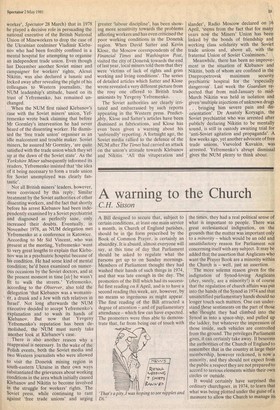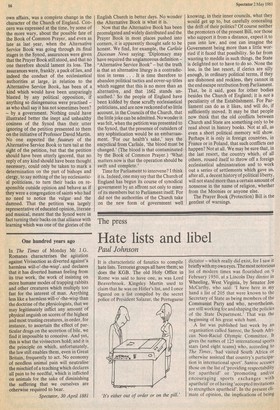A warning to the Church
C.H. Sisson A Bill designed to secure that, subject to certain conditions, at least one main service a month, in Church of England parishes, should be in tbe form prescribed by the Book of Common Prayer, is certainly an absurdity. It is absurd, almost everyone will say, at this time of day that Parliament should be asked to regulate what the parsons get up to on Sunday mornings. Members of Parliament thought they had washed their hands of such things in 1974, and that was late enough in the day. The promoters of the Bill which had its successful first reading on 8 April, and is to have a second reading this week, are, however, by no means so ingenuous as might appear. The first reading of the Bill attracted a degree of attention — and of parliamentary attendance — which few can have expected. The promoters were thus able to demonstrate that, far from being out of touch with the times, they had a real political sense of what is important to people. There was great ecclesiastical indignation, on the grounds that the matter was important only to a minority — which would be an odd and unsatisfactory reason for Parliament not concerning itself with any subject. It may be added that the assertion that Anglicans who want the Prayer Book are a minority within the Church is — well, just an assertion.
The more solemn reason given for the indignation of Synod-loving Anglicans (they, surely, are a minority!) is of course that the regulation of church affairs was put into the hahds of the Synod in 1974 and that unsanctified parliamentary hands should no longer touch such matters. One can understand these sentiments on the part of those who thought they had climbed into the Synod as into a space-ship, and pulled up the ladder, but whatever the impression of those inside, such vehicles are controlled from the ground. The privileges Parliament gives, it can certainly take away. It beseems the authorities of the Church of England to remember that in the country at large their membership, however reckoned, is now a minority, and they should not expect from the public a respect they are not prepared to accord to serious elements within their own circles or outside.
It would certainly have surprised the ordinary churchgoer, in 1974, to learn that what was being plotted under the guise of a measure to allow the Church to manage its own affairs, was a complete change in the character of the Church of England. Concern was expressed at the time, by some of the more wary, about the possible fate of the Book of Common Prayer, and even as late as last year, when the Alternative Service Book was going through its final stages in the Synod, assurances were given that the Prayer Book still stood, and that no one therefore should lament its loss. The assurances were, frankly, a pack of lies, and indeed the conduct of the ecclesiastical authorities at large, in relation to the Alternative Service Book, has been of a kind which would have been unsparingly blasted by any political opposition, if anything so disingenuous were practised — as who shall say it has not sometimes been? — by a government. Nothing could have illustrated better the inept and unhealthy cosiness of the Synod than their utter ignoring of the petition presented to them on the initiative of Professor David Martin. No one expected the fauteurs of the Alternative Service Book to turn tail at the sight of the petition, but that the petition should have been utterly ignored, that no reply of any kind should have been thought necessary, could only be taken to mark a determination on the part of bishops and clergy, to say nothing of the lay ecclesiastical politicians, to turn their backs on responsible outside opinion and behave as if they were a congregation of saints who had no need to notice the vulgar and the damned. That the petition was largely representative of educated opinion, literate and musical, meant that the Synod were in fact turning their backs on that alliance with learning which was one of the glories of the English Church in better days. No wonder the Alternative Book is what it is.
Now that the Alternative Book has been promulgated and widely distributed and the Prayer Book in most places pushed into corners, it is apparently thought safe to be honest. We find, for example, the Carlisle Diocesan News saying: 'Diplomacy may have required the unglamorous definition — "Alternative Service Book" — but the truth is that an alternative liturgy is a contradiction in terms . . . It is time therefore to abandon political tactics and cover-up titles which suggest that this is no more than an alternative, and that 1662 stands unscathed.' So the people of England have been kidded by these scruffy ecclesiastical politicians, and are now reckoned of so little account, in the Councils of the Church, that the little joke can be admitted. No wonder it was felt, when the petition was presented to the Synod, that the presence of outsiders of any sophistication would be an embarrassment. 'For our health's sake,' says the encyclical from Carlisle, 'the blood must be changed.' (The blood is that contaminated by the Book of Common Prayer.) 'What matters now is that the operation should be swift and complete.'
Time for Parliament to intervene? I think it is. Indeed, one may say that the Church of England has begun its course of synodical government by an affront not only to many of its members but to Parliament itself. For did not the authorities of the Church take on the new form of government well knowing, in their inner councils, what they would get up to, but carefully concealing the drift of their politics? Of course neither the promoters of the present Bill, nor those who support it from .a distance, expect it to pass into law, and one can imagine the Government being more than a little worried if it faced that possibility. So far from wanting to meddle in such things, the State is delighted not to have to do so. None the less, in the last resort, if clerics are silly enough, in ordinary political terms, if they are dishonest and reckless, they cannot in the end escape retribution from Parliament. That, be it said, goes for other bodies besides the Church of England; it is not a peculiarity of the Establishment. For Parliament can do as it likes, and will do, if sufficiently moved. It may be that people now think that the old conflicts between Church and State are something only to be read about in history books. Not at all, as even a short political memory will show. Perhaps it is only in foreign countries, in France or in Poland, that such conflicts can happen? Not at all. We may be sure that, in the last resort, the country which, of all others, roused itself to throw off a foreign ecclesiastical administration and to work out a series of settlements which gave us, after all, a decent history of political liberty, will not stand more than a certain amount of nonsense in the name of religion, whether from the Moonies or anyone else.
The Prayer Book (Protection) Bill is the gentlest of warnings.



















































































 Previous page
Previous page